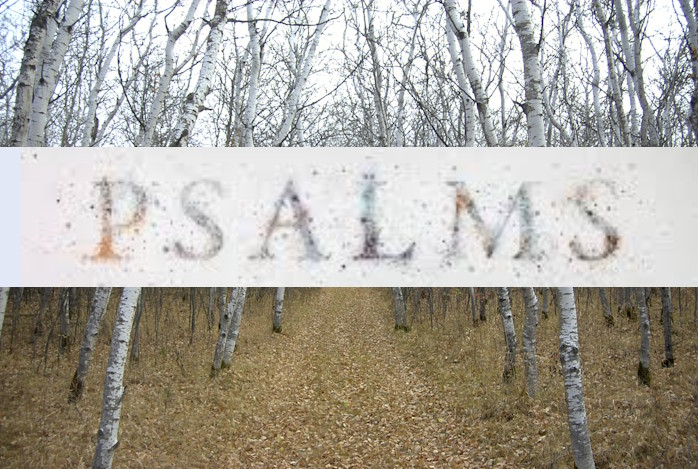For twenty-five years (according to my journal), I have started my day by reading Psalms. Every month, loosely obedient to St. Benedict, I make my way through the 150-song psalter.
I read the old King James version (mainly) and try to read in the monastic way, not unlike the way my uncle Harold did at the breakfast table: slowly, reverently, audibly.
It’s a good way to start the day. It’s a crap way.
I love the Psalms. I hate the Psalms.
I hate them for exposing my motives, my secrets, my resentments.
I love them, for they fathom my darkness, my fear, my desire for security.
I condemn them for their paternalism; I delight in them for their humanism.
I spurn them for their violence and vengeance in the name of God;
I understand them for the same.
Whatever you throw at them will stick. Fire any kind of emotional missile at them, it’s absorbed. Tell them your hateful, vengeful thoughts, every cruel wish, they’ve heard it all before, and worse.
Wonder at their beauty, their quintessence of phrase, their turns of tone,
ride their crescendos of hallelujahs over the hills of praise, then,
plunge into some fiery abyss, choking on their burning words.
You want a ruthless God, a hungry-lion God, a John Wick, Mad Max God? He’s here in all his jealous, furious, warriorlike might, slaying your captors, your enemies, while the dogs lick blood from your shoes.
You want a tender, merciful, consoling God? She is here, holding you, reminding you of your worth: her full attention on your naked, breathing body, her loving thoughts of you, more than all the grains of sand.
You want a heartbroken God? Lead a thankless life.
You want a happy God? Be kind, feed the poor.
You want a joyful God? Open your ears to the cries of the world.
You want an ear for your anger? a hiding place in a harsh night? a blunt reminder of the brevity of life? a target for your curses? a room for grieving? green grass for beauty? still waters for serenity? want to fling taunts, hurl barbs of doubt in God’s face? want to return, hat in hand, and be welcomed as though you’re God’s own child? Done!
These are purgative prayers that cut an X in your thigh,
suck out the venom surging toward your brain.
These are praiseful poems that arrest the self-idolizing ego, then
call out: come, with your torn and battered and wildly contradictory faith.
Read these poets through the lens of politics and shudder at their insight.
Read these poets through the lens of culture and wonder at their modernity.
Read these poems through the lens of earth-care and grieve the groaning of our planet.
Read these poems through the eyes of Christ and enter his wounds, his suffering love.
In every abyss, every cry, every agonized why? in every shout of joy, in all of it, the Psalms simply say, God is.
Take them as you will, they care little for your arguments, your intellect, your ontology; they only report an entanglement with an I Am within and beyond creation. An entanglement that speaks to your heart, your oh-so-human heart.


Your ability to see your own vulnerabilities and contradictions, and allow them to float gently along side your faith and prayers – is inspiring
Ananda, thank you. You are an inspiration.
Stephen, This is wonderful. Thank you!!! “…in the monastic way, not unlike the way my uncle Harold did at the breakfast table: slowly, reverently, audibly.” Great piece!!
Thank you, Thomas. This means a lot to me.
I also have been reading Psalms regularly, one each morning before I practice centering prayer (that’s 20 minutes of focused silence). What’s astonished me in the last couple of years is how accurately the poet(s) of the Psalms describe current politics, especially the actors whose relationship with truth is tangential at best, and the frustration of those desire justice and goodness. I wish I could say that I’ve been encouraged by reading the Psalms, but more often than not, all I can take from the reading is that God has been there before, has seen it all, and yet still walks with us, always. Presence matters. Thanks for your insights and honesty.
Thank you, Edna. Your experience, in most respects, mirrors mine. Thanks for responding.
Stephen…thank you for wonderful poem today. Having been baptized into the Roman Catholic Church and spending my entire twelve years of education in that “thou shalt not” environment I prefer to read the beatitudes to guide my life. I loved your juxtaposition of good and evil….I prefer a loving God.
A powerful piece full of truth. “the psalms simply say, “God is.” Amen and amen!